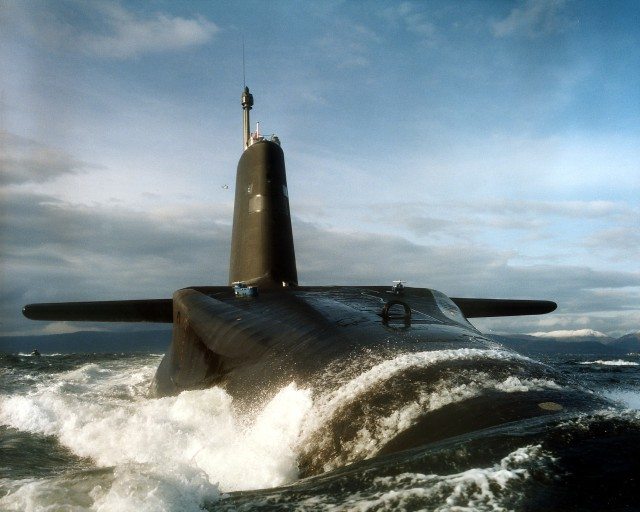Defence Secretary Philip Hammond has warned it would be “reckless” to downgrade the UK’s nuclear deterrent ahead of the release of a Liberal Democrat-led review of alternatives to replacing the Royal Navy’s fleet of Trident submarines.
The Lib Dems have opposed the like-for-like replacement of the Trident system, and the review of alternatives led by junior coalition party Cabinet minister Danny Alexander will be published tomorrow, with reports indicating options covered in the document include halving the number of submarines to two and putting them to sea without nuclear warheads.
But Mr Hammond made clear he rejected any attempts to weaken the UK’s deterrent and said the Government “remains 100% committed to maintaining and renewing the Trident system”.
The fleet of four Vanguard-class submarines which carry the Trident missiles are due to be replaced from 2028, with a final decision on whether to replace all four boats due to be taken in 2016.
In a strongly-worded article in the Daily Mail, Mr Hammond warned against any plan to adopt a “part-time deterrent” and said there were no alternatives to the current system that would offer the “level of protection and security this country needs”.
He said Iran’s nuclear ambitions were an example of why “this is not the time to let down our guard” and argued that reducing the size of the nuclear fleet would result in only minor savings.
Mr Hammond said: “The Government remains 100% committed to maintaining and renewing the Trident system. The logic for this commitment is clear: there is no alternative to Trident that provides the same level of protection and ability to deter an aggressor. The alternatives are less capable, less credible and more expensive. “There will be those who seek to use this review to argue that, even if we continue with Trident, we can downgrade to a part-time deterrent – claiming that our potential adversaries will always give us months of advance warning of an intention to strike.
“I believe that taking such a risk would be reckless. The number of nuclear weapons in the world remains at well over 17,000. Russia is spending 150 billion US dollars (£99 billion) upgrading its forces.
“And there are states, such as Iran, which already have ballistic missiles and are seeking to acquire nuclear weapons. How can anyone be confident that the global security environment will not change in the next 10 years? This is not the time to let down our guard.
“Reducing our fleet of nuclear armed submarines and making our deterrent part-time, would be a false economy. The cost savings would be minuscule compared to the erosion of our national security and the threat to our submarine-building industry.”
He added: “A part-time deterrent carries obvious risks: the risk it may not be available when it’s needed, either as a result of equipment failure, insufficient trained crew or maintenance requirements; the risk that taking the decision to deploy a submarine at a time of nuclear tension would itself make the situation worse; and the risk that an adversary would be tempted to strike first at our deterrent while it is sitting helplessly in its home port, knowing that we have no submarines at sea that could respond.
“In a world which is getting more, not less, dangerous, it is clear to the Prime Minister and to me that there are no alternatives to the current Trident system that offer the level of protection and security that this country needs.”
Mr Alexander told The House magazine last week he hoped the review would “open up a debate about the fact that there are different ways of approaching nuclear deterrents that are responsible with our nation’s security whilst recognising that just like other aspects of our defence we don’t have to be stuck in the same Cold War postures of the past forever”.
But Treasury Chief Secretary Mr Alexander acknowledged that the suggestions in the review would not result in any immediate benefits to the taxpayer.










